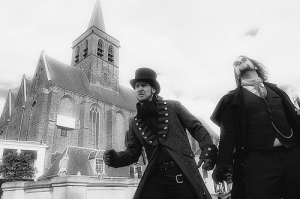The Scrooge of Twindom
My short presentation at the Budapest conference for the International Twin Society for Twin Studies and the World Congress of Twin Pregnancies conveyed my habitual passionate views about what twins require to become healthy individuals. I talked a bit about how parents struggle to differentiate and bond with two babies. Despite our best efforts, we default to labeling rather than describing each child. I am as guilty as the next person of labeling as it provides a shorthand communication that is quicker and more efficient. I also talked about how innocent remarks about each fetus made during ultrasound examinations can lead to assigning personality attributes after the babies are born.
I asked why the same parenting issues that have confronted families of twins for the last fifty years are still ever present. Even though there have been tremendous changes in terms of naming twins and dressing them differently, efforts to help them become individuals remain stultified. The advice from years past is still the same: help others distinguish between them, treat them as individuals, encourage them to do some things differently and some the same, encourage them to do what they need to do to separate from each other, and teach them to relate to others individually.
I suppose that our cultural obsession with twins has increased exponentially with the advent of the Internet. News about twins that goes “viral” heightens the need to idealize the twin connection. Are the color-coordinated twins that were born holding hands destined to be best friends forever? Will they be given any opportunity not to become another twin stereotype? While at times I may appear to be the Scrooge of Twindom, I am a lonely voice crusading for twins’ choices and lifestyles. I do not regard the challenges twins face as abnormal; rather, I am taking the challenges out from under the shadows of twin mysticism and helping twins embrace selfhood.
Have you found yourself resorting to labeling—or found ways to go beyond stereotypes? Please share your experiences.



I have a tendency to tell people that I’m the “evil” twin, because I was the caretaker twin and for a while I was a pretty mean person. I know now, of course, that there is no “evil” or “bad” twin.
I can certainly understand how being the caretaker twin must have contributed to your feeling burdened, annoyed, and guilty.
Hopefully your twin attachment has evolved beyond that developmental stage so that both you and your sibling feel more
entitled to independent life choices and life styles. I have a chapter in The Same but Different devoted to understanding how
this caretaker/caretaking dynamic can sometimes lead to intense resentment. Thanks for sharing your experience.